- News
- Reviews
- Bikes
- Components
- Bar tape & grips
- Bottom brackets
- Brake & gear cables
- Brake & STI levers
- Brake pads & spares
- Brakes
- Cassettes & freewheels
- Chains
- Chainsets & chainrings
- Derailleurs - front
- Derailleurs - rear
- Forks
- Gear levers & shifters
- Groupsets
- Handlebars & extensions
- Headsets
- Hubs
- Inner tubes
- Pedals
- Quick releases & skewers
- Saddles
- Seatposts
- Stems
- Wheels
- Tyres
- Tubeless valves
- Accessories
- Accessories - misc
- Computer mounts
- Bags
- Bar ends
- Bike bags & cases
- Bottle cages
- Bottles
- Cameras
- Car racks
- Child seats
- Computers
- Glasses
- GPS units
- Helmets
- Lights - front
- Lights - rear
- Lights - sets
- Locks
- Mirrors
- Mudguards
- Racks
- Pumps & CO2 inflators
- Puncture kits
- Reflectives
- Smart watches
- Stands and racks
- Trailers
- Clothing
- Health, fitness and nutrition
- Tools and workshop
- Miscellaneous
- Buyers Guides
- Features
- Forum
- Recommends
- Podcast
TECH NEWS
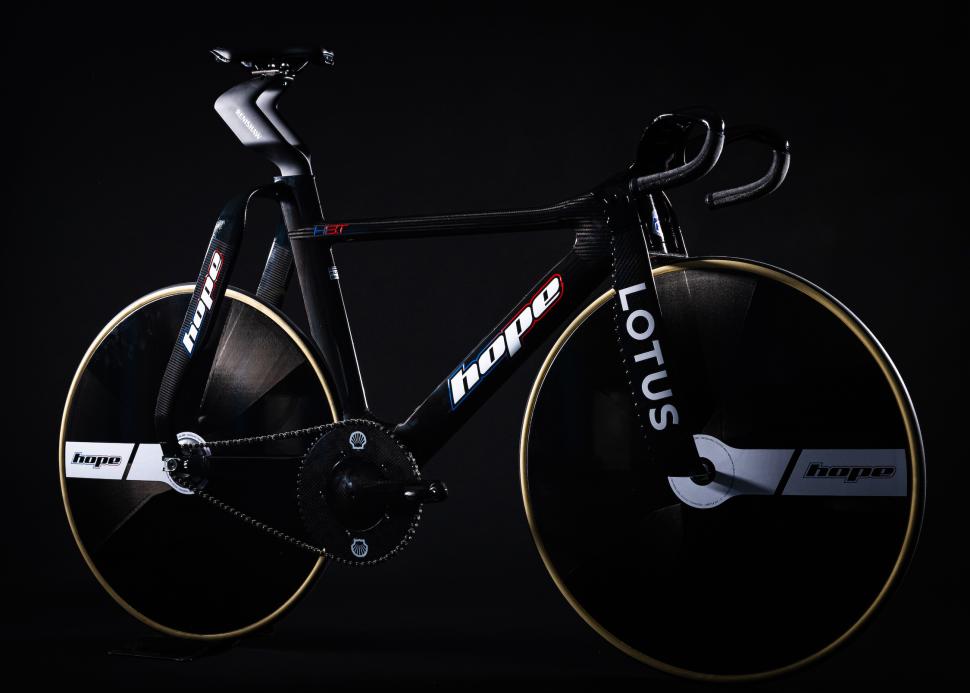 2023 Hope-Lotus bike
2023 Hope-Lotus bikeLotus and Hope reveal new British Olympic track bike: what’s going on with that seatpost?
Lotus Engineering and Hope Technology have unveiled the track bike that’ll be used by British athletes at the Paris 2024 Summer Olympics – a radical-looking design with a HBT Paris Frame developed by Hope, a fork that’s said to be inspired by fighter jets, and a kinked seatpost with a hole in the centre. The second-generation Hope-Lotus bike also features a revised handlebar.
> Take a look at the 2020 Hope/Lotus British Cycling Olympic track bike here
The updated bike is an evolution of the Tokyo 2020 track bike that helped the Great Britain Cycling Team (GBCT) win seven Olympic medals and top the event medal table.
Pics: © SWpix.com (t/a Photography Hub Ltd)
“Lotus and GBCT have developed the cockpit of the bike, evolving the unique front fork and handlebar design to allow for greater aerodynamic efficiency,” says Lotus. “This is coupled with the Hope HBT Paris frame which includes refinements to the headstock and seatstays. Renishaw has provided support in design and production of wind tunnel models and other crucial components on the final bike.”
Lotus says that top-level British riders have been testing the bike both on the track and in the wind tunnel, working alongside Lotus to optimise the fork and handlebar ahead of the bike’s competitive debut at the 2023 UCI Cycling World Championships. It says it has worked to optimise aerodynamics in the bike’s cockpit development and improve front-end feel and stiffness.
The British company says that its Chief Aerodynamicist Richard Hill – who was responsible for the design of the Lotus 108 Olympic track bike and 110 Tour de France bike in the 1990s – played a key role in both the Tokyo Olympic track bike and the 2024 Hope-Lotus Olympic model.
The fork still has the widely spaced legs – designed to reduce drag and break the airflow in front of the rider – that were seen at the Tokyo Olympics, but there are now serrated rear edges “that allow for smoother airflow around the rider”.
“Customisable handlebars help riders to achieve a more efficient aero position for longer races, whilst an enhanced integration with the fork further reduces drag,” says Lotus.
“To guarantee lightness, the composite fork is crafted from the same high-grade carbon fibre and single-cure manufacturing process as the Lotus Evija hypercar. A combination of carbon fibre and 3D-printed metals is used to optimise aerodynamics, ergonomics, structural integrity and light-weighting.
“More than 150 hours of wind tunnel testing and advanced computational fluid dynamics (CFD) simulation has helped to create significant aerodynamic gains. This testing was instrumental in optimising the airflow around the legs of the rider to reduce drag.”
Other bike designs have used jagged edges to reduce drag recently. Pinarello, for example, uses serrations on the leading edges of the seat tube and seatpost of the Bolide F HR 3D that Filippo Ganna rode to smash the UCI Hour Record.
Pinarello said, “By studying how humpback whales can do very tight manoeuvres in the oceans, researchers have found that the tubercles (the protrusions in the front of their flippers) contribute significantly to this ability. Working on this shape applied to bicycles, they have also found that ridges can minimise and reduce drag by generating streamwise vortices in the troughs between the bumps, causing the flow behind the peaks to stay attached.”
The other eye-catching feature of the Hope-Lotus track bike is the seatpost. Rather than being straight, it first kinks backwards and then forwards. The key characteristic, though, is that it appears to be split with a large gap down the centre. This makes us think of the seat tube design of the Trek Madone SLR – which the US brand calls its IsoFlow design.
> Trek Madone SLR - The most aero bike in the Tour de France?
Explaining that technology, Trek said, “IsoFlow is able to increase the energy of the flow around and through the seatstay cluster by providing a clear path for airflow. This improves upon the traditional design in which air must squeeze around the seat tube and seatstays, causing it to interact with your moving legs and in turn increase drag.
“IsoFlow does more than just reduce drag on the frame. The fast-moving air that travels through IsoFlow helps add energy to the area where the most drag of all is generated – behind and below the rider… IsoFlow helps direct air into this low-pressure area and reduce the drag the rider creates.”
Is the Hope-Lotus track bike designed with a similar aim in mind? We don’t yet know the exact rationale but we’ll certainly be asking the question.
Oh, and a final feature that’s bound to draw attention: the Shell logo that’s repeated on the chainring – Shell being an official partner of British Cycling. That whole link-up has proved to be hugely controversial over the past few months.
> "Greenwashing, pure and simple" - fury as Shell UK sponsors British Cycling
Stephen Park, Performance Director for the Great Britain Cycling Team, said, “Our relationship with Lotus Engineering, Hope Technology and Renishaw is going from strength to strength. Their combined high-quality manufacturing standards, renowned lightweight design, aerodynamic efficiency and keen eye for finer details help us to unlock valuable marginal gains, which make all the difference come race day. This is the most advanced bike that has ever been ridden by British athletes.”
The 2023 UCI Cycling Track World Championships start in Glasgow on 2nd August while the Paris Olympics run July-August 2024.
Mat has been in cycling media since 1996, on titles including BikeRadar, Total Bike, Total Mountain Bike, What Mountain Bike and Mountain Biking UK, and he has been editor of 220 Triathlon and Cycling Plus. Mat has been road.cc technical editor for over a decade, testing bikes, fettling the latest kit, and trying out the most up-to-the-minute clothing. He has won his category in Ironman UK 70.3 and finished on the podium in both marathons he has run. Mat is a Cambridge graduate who did a post-grad in magazine journalism, and he is a winner of the Cycling Media Award for Specialist Online Writer. Now over 50, he's riding road and gravel bikes most days for fun and fitness rather than training for competitions.
Latest Comments
- HLaB 1 hour 23 min ago
It's hopefully an urban myth but I heard it was designed that way on purpose, so the cyclepath captured any flooding and the busway would remain clear
- mdavidford 1 hour 25 min ago
I should imagine eating chopsticks anywhere could be potentially rather perilous.
- wtjs 1 hour 26 min ago
In practice, the expletive-deleted police here do nothing at all when the 'clearance' is demonstrably 1/3 of this '1.5 metres or less- see the Audi...
- Rendel Harris 1 hour 43 min ago
When The Badger stopped for protesters (albeit dockworkers rather than farmers) it was their stress gauges rather than his that would have been...
- mdavidford 1 hour 44 min ago
Never mind that. More importantly, since when does a bike lock qualify as a 'tool'?
- wtjs 1 hour 40 min ago
there are far more decent Audi drivers then those who give that brand it's current appalling reputation for bad driving...
- Eurodolphin 2 hours 29 min ago
Having experienced a brain injury (while my helmet only suffered a little crack) I welcome all this excellent research which looks for ways to...
- mattw 2 hours 32 min ago
Nope. Has anyone ever bought a wheel trim studded with diamonds for their car? Thought not.
- David9694 2 hours 55 min ago
Dad of William Brown Jr battles Folkestone Town Council over illuminated sign featuring late son’s picture...
- Disgusted of Tunbridge Wells 4 hours 2 min ago
All ebikes are equal... But folding ebikes are more equal than others?...
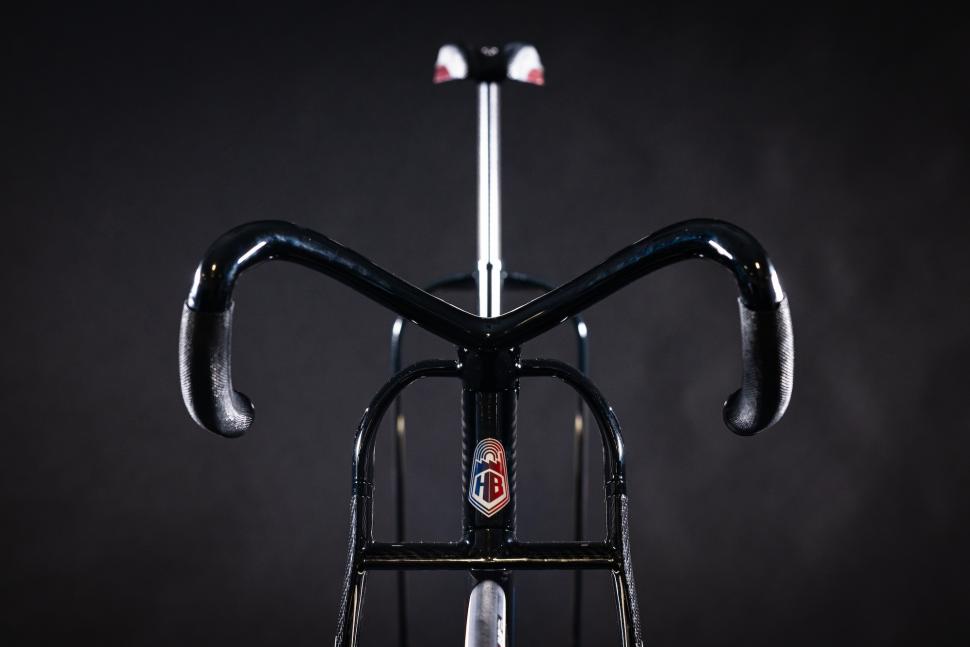
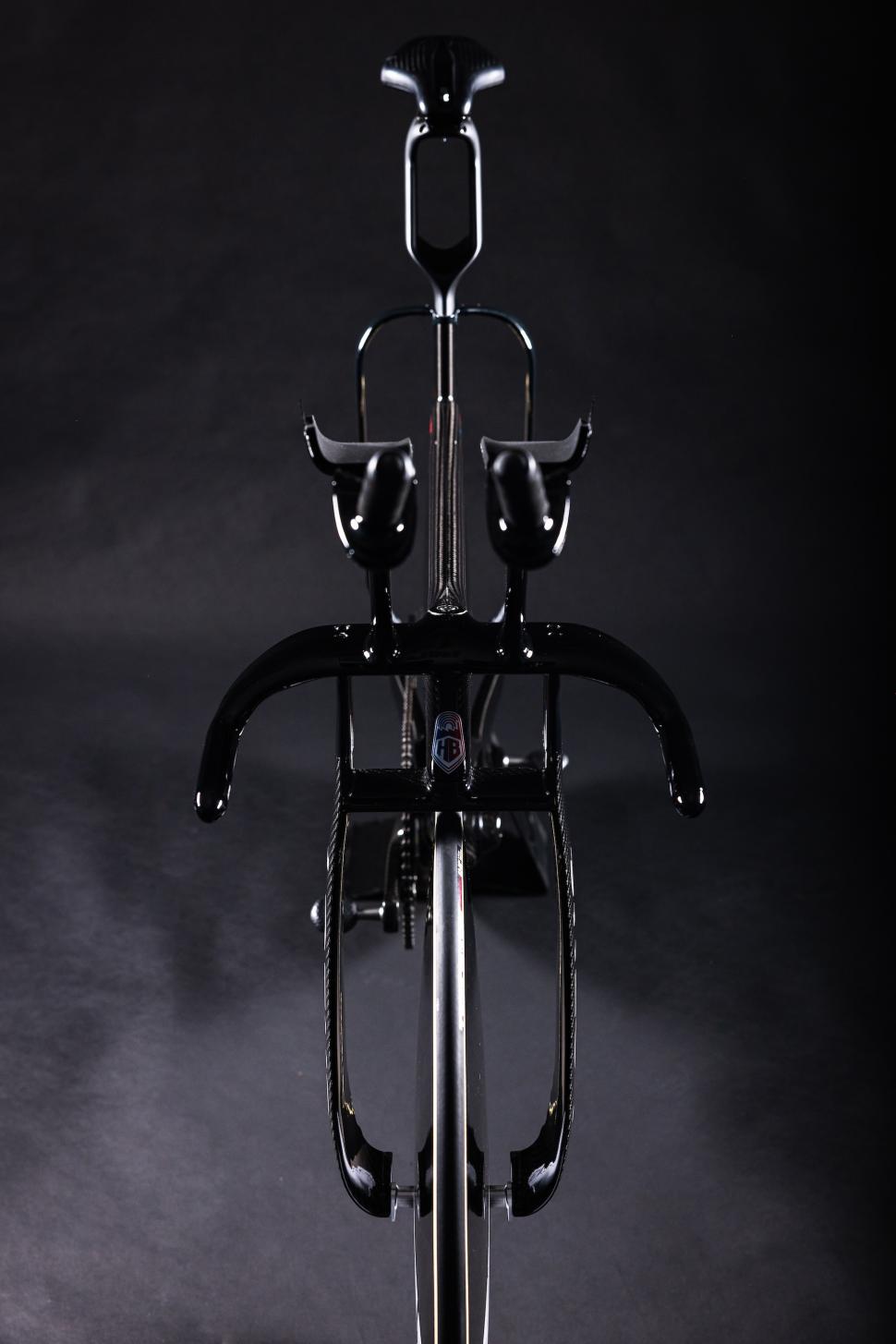
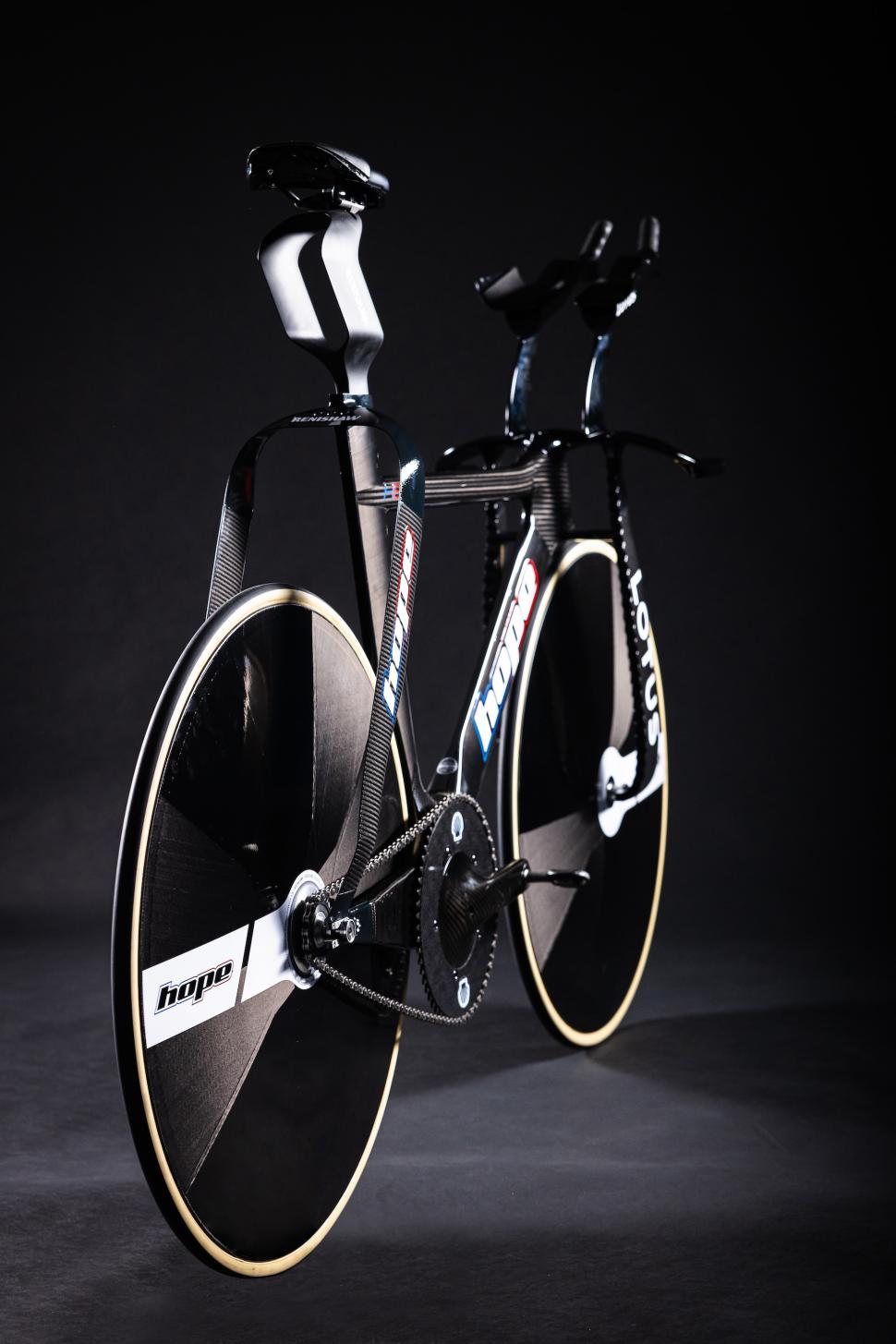

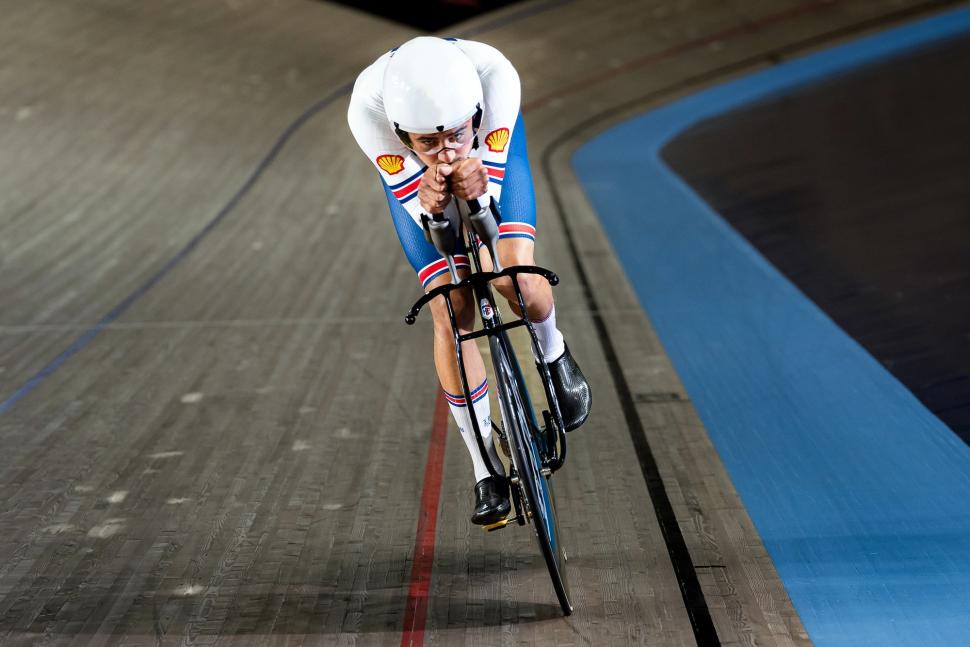
Add new comment
6 comments
'The fast-moving air that travels through IsoFlow'
Hmm, the air's stationary(ish) in real life on the road/track, & it's the bike that's moving!
Gotta be for all those ninja cyclists...
Presumably the designer only had crayons to work with?
They've done their best to hide how ugly the bike is, but it still shines through
Pointless black on black picture. Impossible to see any detail. Perhaps that's the intention.
They've not revealed a great deal with those photos though (I assume deliberately before the championships?)
Love the innovation. Top marks to all